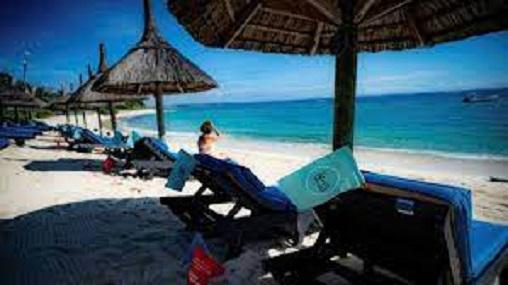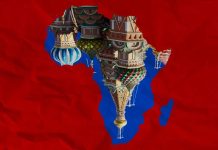Africa-Press – Mauritius. In the main restaurant of the Trou aux Biches Beachcomber hotel on the northern tip of Mauritius, guests are dining alfresco by the Indian Ocean. It is a balmy Sunday night in February, summer in the southern hemisphere.
The hotel — the island’s largest five-star, set in manicured tropical gardens and with a secluded beach — has put on a Mauritian buffet for its 600 mainly European guests.
There’s a whole roast pig, sundry grilled meats, local fish and several dishes representing the Indian, French, African and Chinese influences on the Mauritian palate.
A man, sporting blue rubber gloves in deference to Covid protocols, rolls fluffy lentil pancakes and a woman is churning out hot chapattis to go with pea, potato and lamb curries.
A troupe of female dancers in the wooden-decked bar area perform the Sega, brought to the islands by African slaves. A few months ago, none of this would have been happening.
For 18 months, hotels were practically empty — catering only to staycationers, returning residents subject to strict quarantine rules, and the odd remote worker who had wangled lockdown in paradise 1,800 miles off the coast of south-east Africa.
At the One&Only Le Saint Géran hotel on the east coast, the 500 staff came in on rotation to ensure that the 143 rooms were maintained to their customary standard, even in the absence of guests.
“A hotel that’s not lived in needs a lot of TLC,” observes Roman Goetsch, the general manager.
Only since October, when Mauritius opened its borders after double-vaccinating nearly 80 per cent of its population, has the island’s tourism industry flickered back to life.
“It is a candle at the end of the tunnel,” says Jean-Louis Pismont, chief operations officer of Beachcomber Resorts & Hotels.
Weeks after Mauritius reopened, Omicron’s appearance in South Africa led to a temporary ban on travel to and from southern Africa, including Mauritius. That put a damper on the normally peak Christmas and New Year season.
Russia’s invasion of Ukraine has since disrupted the small but lucrative market of eastern European tourists and, with higher oil prices, pushed up the likely cost of long-haul flights.
“We are in convalescence,” says Pismont. The Beachcomber group includes Trou aux Biches and properties such as the Royal Palm, at Grand Baie in the island’s north west.
Still, he adds, the luxury end of the market has sprung back to life faster than expected. “Some people couldn’t wait to get back,” he says. “The French have returned en masse .
. but, for the small three-star operators, it’s tough.
Government wage-support schemes and cash injections into some operators kept the tourist industry on life support during the pandemic.
At the pleasantly sleepy national Botanic Garden — founded in 1770 — in the north-west district of Pamplemousses, Stellio, a guide, says: “For a small country like Mauritius, the government helped a lot.
” The authorities are banking on the swift recovery of an industry that makes up at least one-fifth of the economy.
This year, they are projecting 1mn tourists, below the 1.4mn in 2019 but, if achieved, enough to breathe life back into the sector. Sceptical opposition politicians describe it as a “stretch target”.
Demand from Europe, the island’s tourist mainstay — especially France, the UK and Germany — has recovered strongly, say officials. Arvind Bundhun, director of the island’s tourism promotion authority, says visitors are spending more per day than before Covid-19 — a trend accentuated by the weaker rupee.
They are also staying longer, he adds, typically 14 days compared with nine pre-pandemic. Much depends on airline routes. A resuscitated Air Mauritius flies daily to Paris, and three times a week to the UK.
It has daily routes to South Africa and Réunion, important markets. Emirates has a daily flight from Dubai, operating an Airbus A380-800 for about 600 passengers.
Bundhun hopes that, as health restrictions ease further, more routes will follow: “The most difficult part is behind us. ” At the One&Only Le Saint Géran, it seems that way, according to Goetsch.
“Since reopening, it’s been extremely positive, much more than any of us could have hoped,” he says, noting that one guest had visited the hotel 44 years in a row, a habit broken only by the lockdown.
“We literally had guests thanking us for reopening. Le Saint Géran is the kind of hotel that offers helicopter transfers from the airport, in order to spare guests the one-hour road trip.
It is located on a private peninsula with views of both the crashing ocean and a tranquil lagoon. As well as the generally near-perfect climate and beauty of the ocean, Goetsch attributes Mauritian tourism success to the island’s hospitality.
Bilingual in English and French, Mauritian staff are so sought after that cruise line operators hire local agencies to poach them from hotels. Having been ghostly for much of the pandemic, Le Saint Géran appears back to normal, save for mandatory mask-wearing in public areas.
The sommelier is recommending wine pairings for the cod with miso at the Tapasake ocean-side fusion restaurant, the spa has resumed bookings for an array of treatments, and the tennis instructor puts guests through their sweaty paces.
Goetsch says the only difference is that people are not booking a year in advance as they once routinely did. “There’s a lot of pent-up demand for a vacation,” he says.
“But these days nobody really plans ahead any more.”
For More News And Analysis About Mauritius Follow Africa-Press







